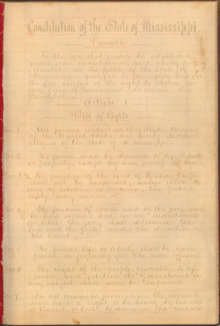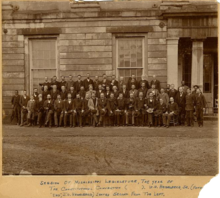Constitution of Mississippi
[10] The 1890 constitution effectively granted the Democrat-controlled Mississippi government free rein to prevent almost all African Americans from voting and casting ballots, in addition to forcing them to attend separate schools (almost always deliberately of substandard quality), forbidding them to marry people of other ethnic groups, or bear arms for self-defense.
[5][6][11][12][13][14][15] In the 1950s and 1960s, following investigations by the United States government,[16] these discriminatory provisions were ruled by the U.S. Supreme Court to have violated the rights guaranteed to American citizens under the tenets of the U.S. Constitution, thus rendering them legally unenforcable.
The 1868 constitution's preamble stated the purpose of the constitution's creation and adoption, which was given as, the establishment and perpetuation of "justice", "public order", "right", "liberty" and "freedom": To the end that justice be established, public order maintained, and liberty perpetuated, we, the people of the State of Mississippi, grateful to Almighty God for the free exercise of the right to choose our own form of government, do ordain this Constitution.This differed from the wording of the 1890 state constitution that replaced it, in which any and all references to "justice", "public order", "liberty", "right" and "freedom" were completely and utterly removed from the preamble by the convention's delegates.
On March 11, 1890, Mississippi's Democratic governor, John M. Stone, declared that on July 29 an election was to be held to select delegates to attend the constitutional convention, which would begin in August.
[16][27] During the convention, which took place in Jackson and began on August 12, 1890,[16] running through November 1, several issues were discussed, ranging from the construction of levees in the flood-prone Mississippi Delta to the regulations of railroads.
However, the most important issue, indeed, the primary cause, catalyst and reasoning for why the convention had been called into being in the first place, were the implementation of "literacy tests" and "poll taxes" as prerequisites for voting, the intended subjective enforcement of which would disenfranchise virtually nearly every African American in the state for decades.
...One opposing delegate, a former Confederate general and lawyer from Adams County named William T. Martin,[32] continued this train of thought of the convention's members, stating: ... What are you here for, if not to maintain white supremacy?
The Democrats justified their bigoted views regarding African Americans using a mixture of pseudo-scientific racism[29] and a discredited alternative misinterpretation of the Christian Holy Bible.
A slightly modified version of this proposed clause was included into the completed constitution, with "Mongolian race" being replaced with that of a person having "one-eighth or more of negro blood".
[40] In an 1896 ruling, the Mississippi Supreme Court, of which the 1890 convention's president later became a member, delivered a legal opinion regarding the justification and reasoning the Democrats had used for the adoption of the 1890 constitution in Ratliff v. Beale, and how it came to be.
This was succeeded by a semimilitary, semicivil uprising, under which the white race, inferior in number, but superior in spirit, in governmental instinct, and in intelligence, was restored to power.
Within the field of permissible action under the limitations imposed by the federal constitution, the convention swept the circle of expedients to obstruct the exercise of the franchise by the negro race.
[42] In addition, the Democrats did not want to adjust their policies to better suit the interests of the state's African American constituents, nor did they desire to abandon their bigoted views and see them treated with dignity and respect on an equal footing.
[5] As J.B. Chrisman, a judge from Lincoln County, Mississippi remarked, in salutatory praise of the 1890 constitution, marginalizing and disenfranchising African Americans was seen as a kind of social badge of honor for Southern Democratic men: My God!
[29] Like most former Confederates and Democrats at the time, Calhoon was a fervent believer in patriarchal white supremacy and was vehemently opposed to any basic civil rights for African Americans.
For supporting the right of black Mississippians to vote in the state's elections, Cook was lynched and killed on a remote rural road, a common fate for many who opposed the Democrats at the time.
[49][50][51][52] Attorney General Mike Moore filed a lawsuit against Molpus in Hinds County Circuit Court on March 28, to allow the referendum to appear on the ballot.
[55][56] State Senator Rick Lambert sponsored legislation supported by Molpus to create a referendum system that required signatures from equaled to 10% of the votes in the most recent gubernatorial election.
[24][25][65] Although slavery may have been legally ended by the Thirteenth Amendment, the ideology that the Confederates and Democrats had used to justify it did not, with it now being used by them as the rationale to deny the freed slaves and African Americans basic civil rights and freedoms.
As former abolitionist Frederick Douglass noted in a December 1869 speech delivered in Boston, Massachusetts: ... Southern gentlemen who led in the late rebellion have not parted with their convictions at this point, any more than at any other.
They have not yet learned that when a principle is gone, the incident must go also; that what was wise and proper under slavery is foolish and mischievous in a state of general liberty; that the old bottles are worthless when the new wine has come; but they have found that land is a doubtful benefit, where there're no hands to till it.
He stated that the U.S. government should protect the rights of all its citizens from being infringed upon, regardless of their color: ... During my two terms of office the whole Democratic press, and the morbidly honest and 'reformatory' portion of the Republican press, thought it horrible to keep U.S. troops stationed in the Southern States, and when they were called upon to protect the lives of negroes–as much citizens under the Constitution as if their skins were white–the country was scarcely large enough to hold the sound of indignation belched forth by them for some years.
The previous year, in November 1875, terrorists and Democrats had forcibly kept many black and Republican voters from going to the state's polls in a fraud-wrought election, using armed violence.
With the ascension of Rutherford B. Hayes to the U.S. presidency and the subsequent Compromise of 1877, a Southern Democrat was appointed to the U.S. cabinet and the U.S. Army's forces were withdrawn from public and confined to their bases, leaving 1,155 soldiers by 1879.
They set their sights on replacing the 1868 constitution of Mississippi, which legally guaranteed freedoms, citizenship, enfranchisement and other human rights to black citizens, to which both Northern and Southern Democrats were vehemently opposed.
These were later determined to be unconstitutional by a US Federal Circuit Court in Graham v. Waller, as they served no compelling state interest, and a 30-day residency requirement was instituted in the same judicial order on a temporary basis.
[15] Despite the 1890 constitution's seemingly un-discriminatory wording on the surface on the subject of voting, Mississippi governor James K. Vardaman, a staunch Democrat, boasted about its enabling of the state government to implement the disenfranchising of black voters.
It did this in Article 3's Section 12, by shifting the right of bearing arms from the broad definition of "all persons" to the more restrictive term of "citizen" only,[12][13][14] who were intended to be limited to white men only by the 1890 constitution's framers.
However, Democrats, who objected fervently to any marriages between African Americans and whites, reinstated these laws when they violently took control of the states from Republicans in the 1880s and 1890s, instituting Jim Crow and segregation shortly thereafter.
[42]This patriarchal white supremacist view held by the Democrats, who sought to limit educational and economic opportunities for African Americans, differed greatly from the views of that of the Republicans in the 1870s and 1880s, who believed that African Americans should be allowed to vote, own land and property, attend high-quality schools and own firearms, believing that doing so was morally right and would improve the strength and well-being of the country: We have got to choose between two results.





